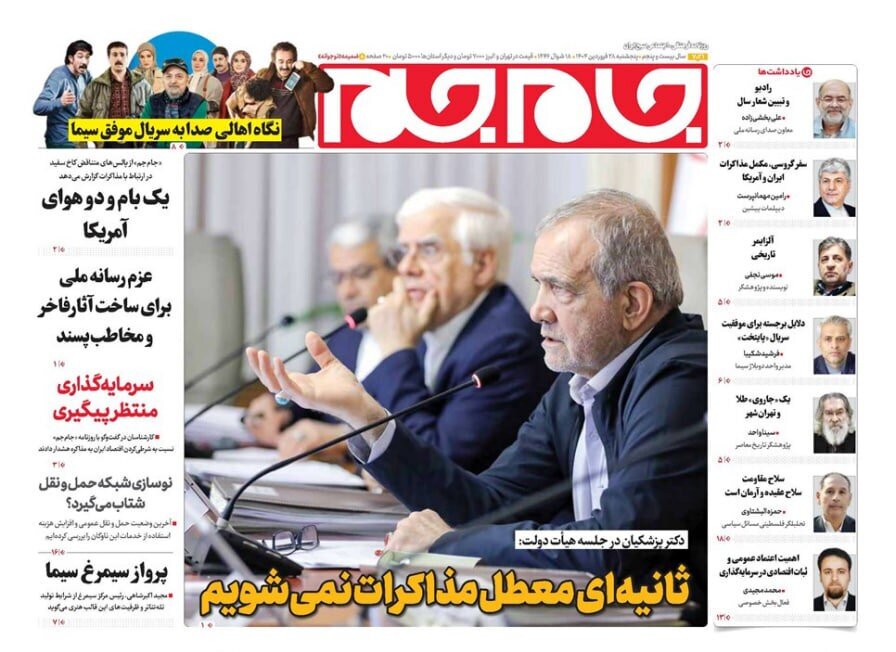Jam-e-Jam: Disagreements in Trump's team and strategic confusion

In an explanation, Jam-e-Jam dealt with the contradictory statements by the American side in the negotiations with Iran. It wrote: These contradictions in the U.S. positions are most likely the result of disagreements within the Trump security team. Multiple reports from American media, particularly Axios, indicate that Trump's national security members are in serious disagreement over the best approach to dealing with the Iranian nuclear issue.
While some members of the security team, led by Vice President J.D. Vance, are emphasizing political negotiations, some other members are pushing for maximum pressure and even military action against Iran. These disagreements have not only led to confusion in U.S. foreign policy but also damaged Washington's credibility in the international arena. Trump has consistently shown contradictions in his positions that would greatly reduce the likelihood of reaching a lasting agreement. This confusion, especially on the eve of the second round of negotiations, could lead to the loss of existing opportunities to resolve the Iranian nuclear issue.
Farhikhtegan: Witkoff's inconsistent stance is part of a plan
Farhikhtegan examined Witkoff's changing stance after the first round of negotiations with Iran and wrote: Witkoff said that Iran must stop its nuclear enrichment and weapons program in his interview with Fox News after the April 12 negotiations in Oman. He also said his statements are in complete coordination with Trump. It seems that the changing statements by Witkoff are a predetermined plan to win at the negotiating table and ultimately pursue the same goal that they emphasize in their media statements: shutting down Iran's nuclear program. The important point is that the United States wants to take these concessions from Iran step by step. Therefore, the need to be vigilant and have a clear idea and framework for negotiations with the Americans is felt more than ever before. The Americans are pursuing the carrot and stick policy this time in the style of Trump’s policy. They are looking to gain more points with a series of green lights for negotiations and the threat of military attack on Iran’s nuclear facilities.
Arman-e-Emrooz: Extremists’ new move to undermine negotiations
In a note, Arman-e-Emrooz addressed the extremists’ new plan to undermine negotiations and said: With the clarification of the Islamic Republic’s position on the principle of negotiations and the Leader of the Revolution’s emphasis that the recent process of negotiations was a major decision by the establishment, part of the country’s political equations has changed. Political analysts believe that the extremists are more concerned about the outcome of the negotiations than anything else. Because if successful, not only will the sitting government’s position be strengthened, but their narratives will also be questioned. This change in tactical stance, according to observers, indicates an attempt to maintain their social and political base in the new circumstances. According to Heshmatollah Falahatpisheh, an expert on political issues, we have witnessed the Americans adopting a harsh position immediately after the first round (of negotiations), including talk of a complete stop to Iran's nuclear program and even monitoring the country's conventional military programs. This set of circumstances shows that the negotiating team is facing a serious challenge, and the least thing one can expect is that domestic extremists will not create additional problems for them in this situation.
Ettelaat: Billions of dollars will flow to Iran in case of Tehran-Washington agreement
In an interview with former diplomat Fereydoun Majlesi, Ettelaat discussed the benefits of a possible nuclear agreement with the United States. He said: A possible agreement between Iran and the United States would provide economic cooperation and billions of dollars of profit for Iranian contractors and exporters. If the negotiations are successful, better relations will be established with China without fear of sanctions. Now, Turkey is an industrial country, Saudi Arabia has taken a step towards advanced industrialization and is the world leader in petrochemicals, and we need imports from Saudi Arabia, while in the current situation, our trade with Saudi Arabia is very low due to sanctions. Even now we have abundant trade with the UAE, let alone if the sanctions are lifted. Qatar, Kuwait, and Iraq are also developing, and the agreement between Iran and the United States will provide economic cooperation and billions of dollars of profit for Iranian contractors and exporters. The sanctions have only benefited dealers, who are using Iran's problems to their advantage and generally withdrawing their money from Iran.
